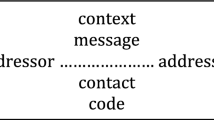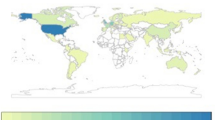Abstract
Ethical issues in linguistic fieldwork have received surprisingly little direct attention in recent years. This article reviews ethical models for fieldwork and outlines the responsibilities of linguists involved in fieldwork on endangered languages to individuals, communities, and knowledge systems, focusing on fieldwork in a North American context.
Similar content being viewed by others
Notes
To give just a few, see the websites of the Society for the Study of Indigenous Languages of the Americas (http://www.ssila.org), the Endangered Languages Fund (ELF, www.endangeredlanguagefund.org), the Foundation for Endangered Languages (FEL, http://www.ogmios.org/home.htm), the Volkswagen Foundation (http://www.volkswagen-stiftung.de/), The Hans Rausing Endangered Languages Project (http://www.hrelp.org), Teaching Indigenous Languages (http://jan.ucc.nau.edu/~jar/TIL.html).
This is not to say that linguists have been inattentive to ethical responsibilities; there has simply been less written about them. Anthropologists have written far more about ethical issues in fieldwork; see, for example, Clifford and Marcus (1986), Fluehr-Lobban (1991), and Schieffelin, Woolard and Kroskrity (1998) for just a few examples.
See Vaux and Cooper (1999) for a recent textbook on field methods. As pointed out by Czaykowska-Higgins (2002), Vaux and Cooper identify fieldwork as playing a role in saving an endangered language and as providing personal enrichment and satisfaction for the linguist in addition to gathering the broad range of data that is required for quality linguistic work. As Czaykowska-Higgins says, this is not a claim about social responsibility, and thus even this recent text most properly falls within the ethical research model.
A second book, Newman and Ratliff (2001), is a collection of articles on linguistic fieldwork. As Newman and Ratliff discuss in the introduction to the book, “... linguistics has paid so little attention to ethical concerns” (p. 9). They point out that, while “concerns about ethically appropriate behavior in the field are implicit in all the contributions to this volume, but on the whole receive only passing mention. ... the focus is almost exclusively on responsibilities towards one’s informant(s) and sometimes the related question of covert tape recording” (p. 9). Newman and Ratliff go on to identify a number of questions that fieldworkers should consider, including how forthright fieldworkers should be in explaining their scholarly objectives, whether secrecy is necessarily inappropriate, responsibilities around university regulations regarding human subjects, protection of anonymity, proper acknowledgement, intellectual property rights, recompense, responsibilities of an outsider in a community, ethics of how grant money is used, obligations to host country scholars and students, making materials available. A few of their questions touch at the heart of the issues that I raise in this article, and I quote from their questions: “What recompense if any does a fieldworker owe the community as a whole for allowing him or her to be an uninvited guest? That is, apart from avoiding bad behavior, does the fieldworker have a positive duty to devote time and energy to community projects, and if so how much (see Newman, 1999)? Conversely, if a linguist has been contracted to do practical work in the field – for example, prepare literacy materials (perhaps in a majority language for use by minority-language speakers), is it ethical for the linguist to steal time away to do pure research that he or she feels is of critical importance, such as documenting an endangered language?”
The term ‘informant’ has been largely replaced by the term ‘consultant’ in linguistic fieldwork; see below for further discussion.
There has been a growing awareness over the past 20 years or so of the increasingly rapid rate at which languages are disappearing; this is referred to as the loss of linguistic diversity or as language endangerment. For detailed discussion, see Grenoble and Whaley (1998); see also Crystal (2000), Nettle (1998), and Nettle and Romaine (2000) and references therein for further discussion.
See Czaykowska-Higgins (2002) for further discussion of this point.
References
American Anthropological Association. AAA Code of Ethics. http://www.aaanet.org/committees/ethics/ethcode.htm.
Battiste, M. and Henderson, J. (Sa’ke’j) Y. (2000). Protecting Indigenous Knowledge and Heritage: A Global Challenge. Saskatoon, SK: Purich.
Bobaljik, J. (1998). Visions and realities: researcher–activist–indigenous collaborations in indigenous language maintenance, In E. Kasten (Ed.), Bicultural Education in the North, Münster: Waxmann Verlag, pp. 13–28.
Cameron, D. (1998). Problems of empowerment in linguistic research, Cahiers de l’ILSL 10, 23–38.
Cameron, D., Frazer, E., Harvey, P., Rampton, M. B. H., and Richardson, K. (1992). Researching Language: Issues of Power and Method. New York: Routledge.
Cassell, J. and Jacobs, S-E. (1987). Handbook on Ethical Issues in Anthropology. Washington DC: American Anthropological Association.
Clifford, J. and Marcus, G. E. (1986). Writing Culture: The Poetics and Politics of Ethnography. Berkeley, CA: University of California Press.
Collins, J. (1992) [1998]. Our ideologies and theirs, In B.B. Schieffelin, K.A. Woolard, and P.V. Kroskrity (Eds.), Language Ideologies: Practice and Theory, New York: Oxford University Press, pp. 256–270.
Craig, C. (1993). Fieldwork on Endangered Languages: A Forward Look at Ethical Issues, Proceedings of the XVth International Congress of Linguists/Actes Du XV e Congrès International des Linguistes, Sainte-Foy, Quebec: Les Presses de l’Université Laval.
Craig, C. G. (1997). Language contact and language degeneration, In F. Coulmas (Ed.), The Handbook of Sociolinguistics, Oxford: Blackwell, pp. 257–270.
Crystal, D. (2000). Language Death. Cambridge: Cambridge University Press.
Cyr, D. (1999). Metalanguage awareness: a matter of scientific ethics, Journal of Sociolinguistics 3(2), 283–286.
Czaykowska-Higgins, E. (2002). Ethical Issues in Linguistic Fieldwork, Paper presented at the Canadian Linguistic Association, Toronto, May.
de Reuse, W. J. (1997). Issues in language textbook development: the case of Western Apache, In John Reyhner (Ed.), Teaching Indigenous Languages, Flagstaff, AZ: Northern Arizona University, pp. 116–128.
Dimmendaal, G. J. (2001). Places and people: field sites and informants, In P. Newman and M. Ratliff (Eds.), Linguistic Fieldwork, Cambridge: Cambridge University Press, pp. 55–75.
Dorian, N. (1998). Western language ideologies and small-language prospects, In L. Grenoble and L. Whaley (Eds.), Endangered Languages: Language Loss and Community Response, Cambridge: Cambridge University Press, pp. 3–21.
England, N. C. (1998). Mayan efforts toward language preservation, In L. A. Grenoble and L. J. Whaley (Eds.), Endangered Languages: Current Issues and Future Prospects, Cambridge: Cambridge University Press, pp. 99–116.
Fluehr-Lobban, C. (Ed.) (1991). Ethics and the Profession of Anthropology: Dialogue for a New Era. Philadelphia: University of Pennsylvania Press.
Geertz, C. (1968). Thinking as a moral act: ethical dimensions of anthropological fieldwork in new states, Antioch Review 28, 139–158.
Gil, D. (2001). Escaping Eurocentrism: fieldwork as a process on unlearning, In P. Newman and M. Ratliff (Eds.), Linguistic Fieldwork, Cambridge: Cambridge University Press, pp. 102–132.
Grenoble, L. A. and Whaley, L. J. (Eds.) (1998). Endangered Languages: Language Loss and Community Response. Cambridge: Cambridge University Press.
Grinevald, C. (1998). Language endangerment in South America: a programmatic approach, In L. A. Grenoble and L. J. Whaley (Eds.), Endangered Languages: Language Loss and Community Response, Cambridge: Cambridge University Press, pp. 124–159.
Hale, K. (1965). On the use of informants in fieldwork, Canadian Journal of Linguistics 10, 108–119.
Hale, K. (1972). Some questions about anthropological linguistics: the role of native knowledge, In D. Hymes (Ed.), Reinventing Anthropology, New York: Pantheon, pp. 382–400.
Hale, K. (1976). Theoretical linguistics in relation to American Indian communities, In W. L. Chafe (Ed.), American Indian Languages and American Linguistics, Lisse: Peter de Ridder, pp. 35–50.
Hale, K. (2001). Ulwa (Southern Sumu): the beginnings of a language research project, In P. Newman and M. Ratliff (Eds.), Linguistics Fieldwork, Cambridge: Cambridge University Press, pp. 76–101.
Hale, K. and Hinton, L. (2001). The Green Book of Language Revitalization in Practice. San Diego, CA: Academic.
Kibrik, A. E. (1977). The Methodology of Field Investigations in Linguistics. The Hague: Mouton.
Labov, W. (1982). Objectivity and commitment in linguistic science: the case of the black English trial in Ann Arbor, Language in Society 11, 165–201.
McLaughlin, F. and Sall, T. S. (2001). The give and take of fieldwork: noun classes and other concerns in Fatick, Senegal, In P. Newman and M. Ratliff (Eds.), Linguistic Fieldwork, Cambridge: Cambridge University Press, pp. 189–210.
Nagy, N. (2000). What I didn’t know about working in an endangered language community: some fieldwork issues, International Journal of the Sociology of Language 144, 143–160.
Nettle, D. (1998). Linguistic Diversity. New York: Oxford University Press.
Nettle, D. and Romaine, S. (2000). Vanishing Voices: The Extinction of the World’s Languages. New York: Oxford University Press.
Newman, P. (1999). ‘We have seen the enemy and it is us’: the endangered languages issue as a hopeless cause, Studies in the Linguistic Sciences 28(2), 11–20.
Newman, P. and Ratliff, M. (Eds.) (2001). Linguistic Fieldwor Cambridge: Cambridge University Press.
Nida, E. A. (1981). Informants or colleagues, In F. Coulmas (Ed.), A Festschrift for Native Speakers, The Hague: Mouton, pp. 169–174.
Rice, K. and Saxon, L. (2002). Issues in standardization and community in first nations’ lexicography, In W. Frawley, K. Hill, and P. Munro (Eds.), Making Dictionaries: Preserving Indigenous Languages of the Americas, Berkeley, CA: University of California Press, pp. 125–154.
Rieschild, V. R. (2003). Origami in a hurricane: current challenges to linguistic research, Australian Journal of Linguistics 23(1), 71–98.
Samarin, W. J. (1967). Field Linguistics: A Guide to Linguistic Field Work. New York: Holt, Reinhart, and Winston.
Schieffelin, B. B., Woolard, K. A., and Kroskrity, P. V. (Eds.) (1998). Language Ideologies: Practice and Theory, New York: Oxford University Press.
Smith, G. H. (2000). Protecting and respecting indigenous knowledge, In M. Battise (Ed.), Reclaiming Indigenous Voice and Vision, Vancouver: UBC, pp. 209–224.
Sutton, P. and Walsh, M. (1979). Revised Linguistic Fieldwork Manual for Australia. Canberra: Australian Institute of Aboriginal Studies.
Vaux, B. and Cooper, J. (1999). Introduction to Linguistic Field Methods, Munich: Lincome Europa.
Wilkins, D. (1992). Linguistic research under aboriginal control: a personal account of fieldwork in Central Australia, Australian Journal of Linguistics 12, 171–200.
Wolfram, W. (1993). Ethical considerations in language awareness programs, Issues in Applied Linguistics 4(2), 225–255.
Acknowledgements
I originally wrote this article for a presentation at the Linguistic Society of America in January 2000, and presented a version of it at Swarthmore College in February 2001. I would like to thank Megan Crowhurst for inviting me to be part of the panel at the Linguistic Society of America, and to the participants in the panel and the audience. I would also like to thank John Alderete for organizing my visit to Swarthmore College, and the members of the panel there, as well as to Ted Fernald and Donna Jo Napoli for much discussion. Ewa Czaykowska-Higgins and I have had many discussions around issues of ethics in fieldwork, and I thank her as well. Finally, a “thank you” to Will van den Hoonaard for encouraging me to submit this article to this particular issue of the Journal of Academic Ethics.
Author information
Authors and Affiliations
Corresponding author
Rights and permissions
About this article
Cite this article
Rice, K. Ethical Issues In Linguistic Fieldwork: An Overview. J Acad Ethics 4, 123–155 (2006). https://doi.org/10.1007/s10805-006-9016-2
Accepted:
Published:
Issue Date:
DOI: https://doi.org/10.1007/s10805-006-9016-2




